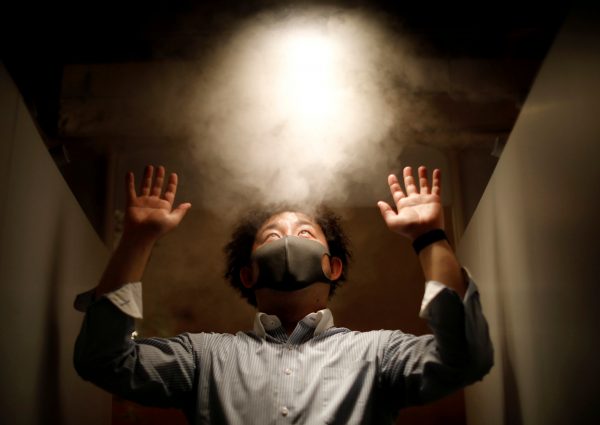In Japan, the infection began to spread in February when the Diamond Princess cruise ship stopped in the port of Yokohama. An infectious disease specialist aboard the ship, Professor Kentaro Iwata of Kobe University, was alarmed by the handling of the situation on the ship. There was no division between dangerous zones and safe zones. Just as Iwata feared, the infection aboard the Diamond Princess spread. The government also allowed passengers to disembark the ship with incomplete polymerase chain reaction (PCR) tests. Inadequate measures to prevent infection after disembarkation then caused great anxiety among the public.
The Japanese government’s response was a failure from the outset. Since the mishandling of the Diamond Princessoutbreak, the expansion of PCR testing has not progressed. Testing rates remain extremely low. From a crisis-management perspective, some compare the government’s COVID-19 response to the Fukushima Daiichi nuclear power plant accident nine years ago, when I served as prime minister. Although the context is different, there are similarities in the crisis situations. The most important thing in a crisis is to first ensure that there is accurate information about what’s going on.
The morning after the accident at the Fukushima nuclear power plant, I promptly visited the site. At that time I was strongly criticised for my actions, with claims that I had ‘disrupted the scene’. But without understanding the level of the crisis at the plant, making informed decisions about an evacuation plan would be impossible.
The evacuation of people — which causes a great deal of distress — must be judged by politics, not by nuclear experts or the plant operator, Tokyo Electric Power Company (TEPCO). I needed to make that judgement. Even now I believe that visiting the disaster site and hearing from the officials in charge was helpful in making a number of decisions in the aftermath of the disaster, despite receiving no information about the exact situation from TEPCO’s head office.
The same is true for COVID-19 control measures. For politicians to make policy decisions, they must listen carefully to the opinions of medical experts who have infectious disease knowledge, such as on the characteristics of COVID-19. The legal system, the financial burden and the division of authority between the different levels of government must be decided by politicians, not medical experts. The failure of the current government’s response to properly distinguish between the judgement of infectious disease experts and that of Prime Minister Shinzo Abe has led to delay in the COVID-19 response.
If Prime Minister Abe has determined that an 80 per cent reduction in human contact is essential to curb the spread of the disease, then he has a responsibility to use all political means to make that happen. The government should explain how Japan can achieve this 80 per cent reduction. If, for instance, the government needs to ask restaurants and other businesses to close, this should first be communicated to the public. The government must then create a situation where workers in these sectors can take time off work with peace of mind by offering compensation packages. That is the responsibility of the prime minister, who is the chief executive.
The response is continuing, but serious thought must be dedicated towards the post-COVID-19 world. Humans have fought many wars throughout history. But according to historians, more people die from infectious diseases than from war. When the 1918 Spanish flu spread after the First World War, the estimated death toll was between 50 million and 100 million — more than the war itself. War can be ended by human will, but infectious diseases are not so easily eliminated.
The cross-border movement of people and goods around the world is increasing rapidly, and it is clear that the spread of infectious diseases cannot be managed solely at the level of the nation-state. The entire human race is at a crossroads as to whether it can overcome the COVID-19 crisis and learn a lesson for the future.
In this context, historian Yuval Noah Harari raises a key point about historical choice. Harari writes, ‘In this crisis we are faced with two important choices … do you prefer “totalitarian surveillance” or “empowerment of citizens”?’ Another choice is between ‘nationalistic isolation’ or ‘world unity’. The important question is what kind of path the world will follow after the crisis ends, and how Japan can make use of the lessons learned to create a vision for the future.
Currently, some of the world’s political leaders blame the spread of the virus on other countries and international organisations. The idea that totalitarian surveillance is more effective in managing it is also gaining currency. It is, of course, necessary to investigate the virus’s origins and cause of the spread. But it is clear that international cooperation is essential for dealing with the spread of infectious diseases in the future. A major challenge for the future will be to build a system of international cooperation that does not follow unilateralism and isolationism.
Naoto Kan is a supreme advisor to the Constitutional Democratic Party of Japan and a member of the House of Representatives. He was prime minister of Japan and president of the Democratic Party of Japan from June 2010 to September 2011.
This article is part of an EAF special feature series on the novel coronavirus crisis and its impact.


From a comparative and interdisciplinary perspective, Butt, Nottage & Nasu (eds) Asia-Pacific Disaster Management (Springer, 2014) suggested that Japan – under your leadership – didn’t do as badly in managing the 2011 triple disasters, although of course there were problems. However, I think you underestimate Japan’s comparative success – under different party leadership – in managing this current global health and economic disaster (as mentioned in my Submission No 56 with A/Prof Tom van Laer to the inquiry by the Australian federal Senate’s Select Committee on COVID-19).